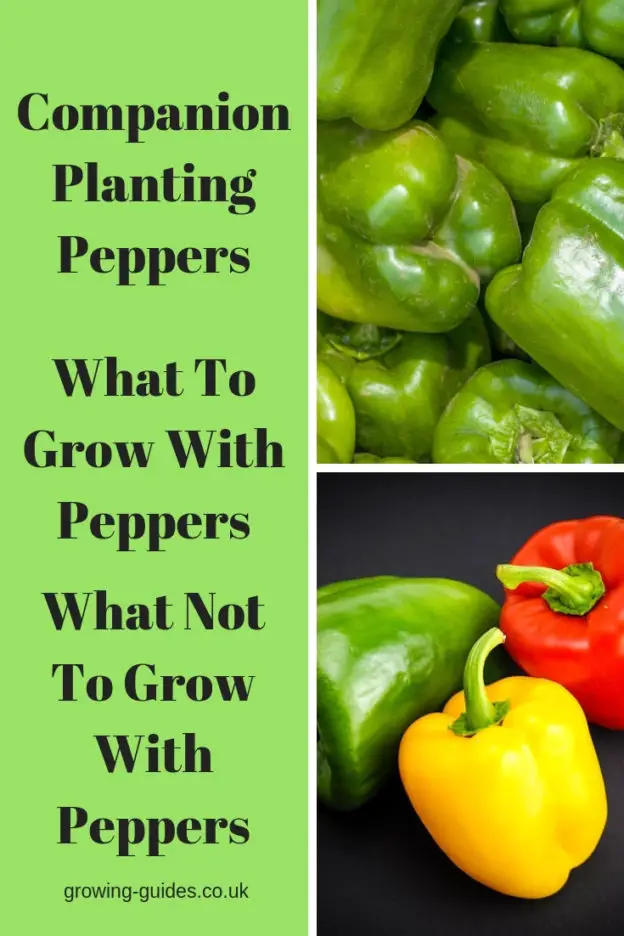Often expensive to buy in the shops, peppers whether green, yellow, orange or red are relatively easy to grow in the home garden. By companion planting peppers with other helpful plants you can certainly give them a much better chance of success.
Companion Planting Peppers
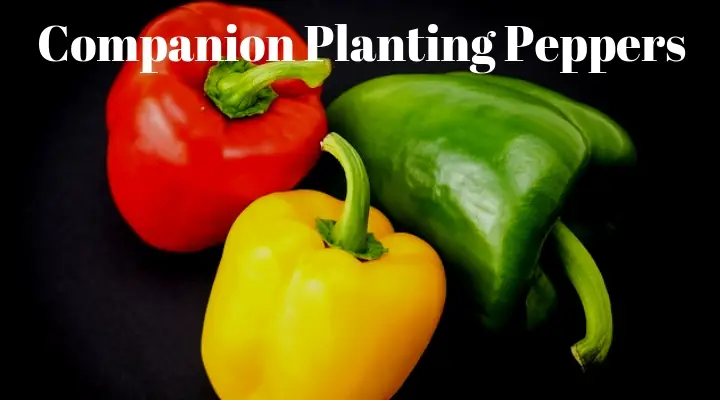
Peppers are a member of the same family as Chillies, Aubergines, Tomatoes and Potatoes so they need to be included in your rotation plan. Plants that will help peppers grow include:-
- Alliums (Chives, Onions and Leeks)
- Beans and Peas
- Basil
- Dill
- Parsley
- Marjoram, Rosemary and Oregano
- Tomatoes
- Radishes
- Petunias, Marigolds and Nasturtiums
- Chard, Lettuce and Spinach
How Does Companion Planting Peppers Help?
Alliums Growing members of the onion family around your pepper plants will help to deter aphids.
Beans and Peas Members of the Legume family fix Nitrogen through the air, which means more nitrogen in the soil for your peppers.
Basil Grow Basil amongst your peppers to repel many garden pests including Ants, Aphids, Beetles and for some reason Slugs as well.
Dill Attracts many beneficial pollinators and deters Aphids and red spider mites.
Parsley Brings Parasitic Wasps to your pepper plants which keep many garden pests under control.
Marjoram, Rosemary and Oregano These herbs will improve the flavour of your peppers and repel pests.
Tomatoes Members of the same family, tomatoes make great companions for peppers as they keep nematodes away and deter Beetles.
Radishes Easy to grow, radishes improve the flavour of peppers and make a great ground cover crop to keep weeds at bay.
Petunias, Marigolds and Nasturtiums These colourful flowers deter many garden pests and attract the good guys. Bees, Hover flies and other pollinators are often seen around these beauties.
Chard, Lettuce and Spinach By growing these shallow rooted plants in with your peppers will not only provide you with plenty of green vegetables, but will also keep weeds away.
Companion Planting Peppers, What Not To Grow Them With
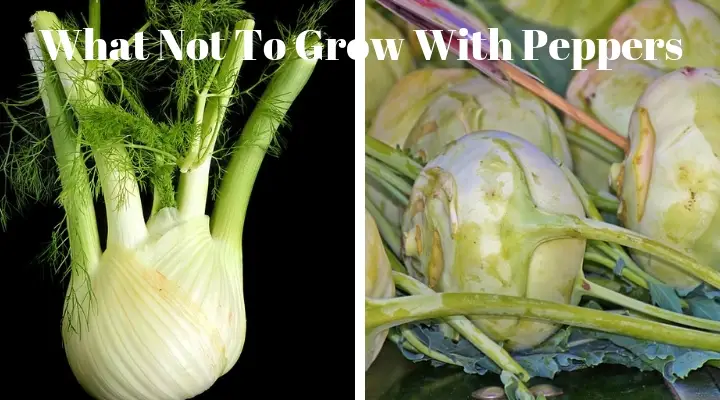
A short list this one, just two no no’s, they are-
- Fennel
- Kohl Rabi
Fennel is an allelopathic plant which means it produces a chemical that stops other plants from growing.
Kohl Rabi This member of the brassica family is very susceptible to Flea Beetle which will spread to your pepper plants and cause unnecessary problems. Given that the flea beetle is attracted to brassicas it is probably best to keep all brassicas away from peppers.
Plants To Keep Peppers Away From
Apricots are very susceptible to a fungal infection that can damage the plants and in serious cases kill them. This fungus is also a common problem for both peppers and chillies.
Companion Planting Bell Peppers
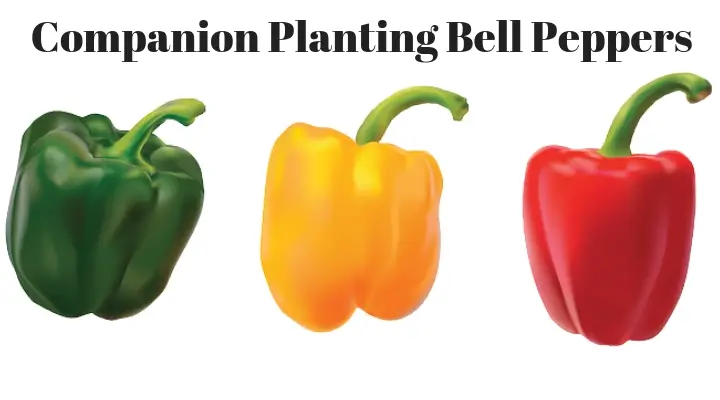
Bell peppers, Green peppers, Red peppers are all capsicums in other words, they’re all the same thing. Green peppers, as they ripen become yellow then orange and eventually red. There are new varieties which are brown, blue and black but the most popular are green or red.
Green peppers are slightly less sweet than yellow and orange peppers with the red peppers being the sweetest. Brown, Blue and Black taste very much like green peppers.

How To Grow Peppers
If you want to grow peppers here in the UK remember they originate in hot climates. So they will have to be grown as annuals, and it’s best to start the seeds off indoors. Start about six weeks before the last expected frost, sow seeds in potting compost and cover with either glass or clear plastic until they germinate.
Keep pots in temperatures of no less than 80 f or 27c and make sure soil is moist. Given the right conditions the seeds should germinate within 10-14 days. When seedlings are big enough (2-3 leaves), transplant to their own pot and bring them on until it warms up outside.
You then need to introduce them to the outside gradually, this process is known as “hardening off”. Basically place them in a sheltered spot outside during the day and bring them back inside in the evening. This is usually done for 7 days, then as long as there is no more frost forecast, they can be planted outdoors.
I always give my newly transplanted plants a handful of Epsom salts to help stop stressing the plants.
As I am in the UK I tend to grow mine in a unheated greenhouse, because they are from hot countries I like to give them as close to their natural temperatures as possible. Also they will definitely not produce any fruit (in this case peppers) unless temperatures are between 70-90 f or 21-32 c. So if we have a typical summer in the UK the only chance for getting any peppers is in a greenhouse.
Caring For Your Pepper Plants
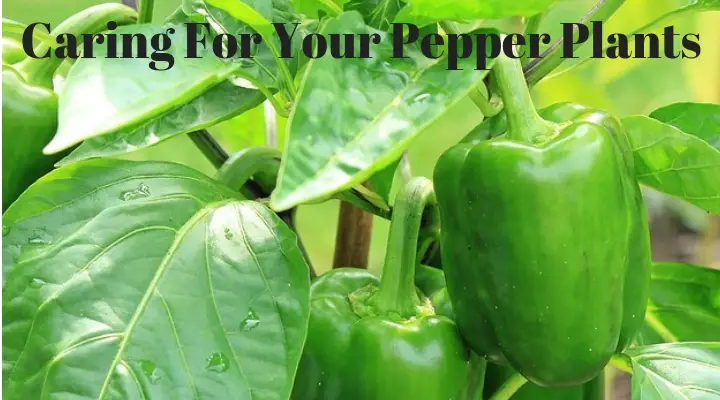
As the plants grow they will need to be staked, because they have shallow roots and hopefully heavy fruits if you don’t stake them they will bend and possibly snap. As soon as the plants start to produce flowers I feed them weekly with home made comfrey tea feed. You can also use a shop bought tomato feed but never use a Nitrogen heavy feed.
Too much Nitrogen will result in plenty of lush green growth but no flowers or fruit. Once flowers start to form leave the greenhouse door and vent open at least during the day. This will attract pollinators, if however you don’t get any pollinators you can use a small paint brush and pollinate them yourself by hand.
To learn how to grow peppers and chilli peppers successfully click here.
What Is The Nutritional Value Of Peppers?
Peppers contain Potassium, Protein, Carbohydrates, Vitamin A, Vitamin B6, Iron, Magnesium, and Calcium in varying small amounts but the most amazing content is I think you’ll agree, 400% of your daily need of Vitamin C in just one medium sized pepper.

